 Petzlover
Petzlover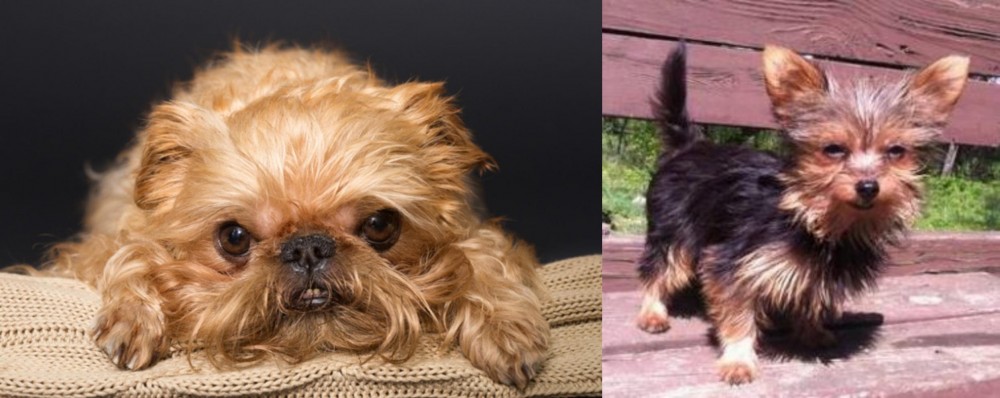 Both Brug and Chorkie are originated from United States. Brug may grow 37 cm / 15 inches higher than Chorkie. Both Brug and Chorkie are having almost same weight. Brug may live 3 years more than Chorkie. Both Brug and Chorkie has almost same litter size. Brug requires High Maintenance. But Chorkie requires Low Maintenance
Both Brug and Chorkie are originated from United States. Brug may grow 37 cm / 15 inches higher than Chorkie. Both Brug and Chorkie are having almost same weight. Brug may live 3 years more than Chorkie. Both Brug and Chorkie has almost same litter size. Brug requires High Maintenance. But Chorkie requires Low Maintenance
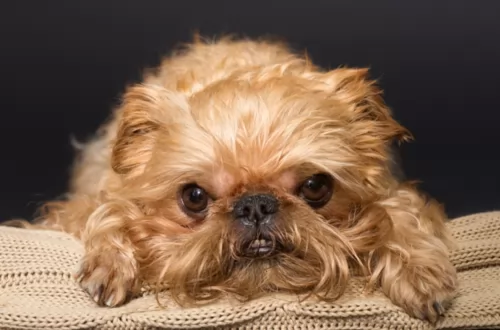 The Brug or Griffon Pug is not a purebred dog at this point in time. It is a cross between a Pug and a Brussels Griffon, currently known as a “designer dog” or a hybrid. This hybrid is really rare at this time but growing in popularity and breeders. Its exact history or original development is unknown at this time and needs to be researched as the hybrid develops into a breed, or breed clubs are formed. If you like either of the two breeds involved, you are sure to like the Brug. They are obviously not recognized by the major kennel clubs, but they are registered with a variety of hybrid/designer dog clubs. These include:
The Brug or Griffon Pug is not a purebred dog at this point in time. It is a cross between a Pug and a Brussels Griffon, currently known as a “designer dog” or a hybrid. This hybrid is really rare at this time but growing in popularity and breeders. Its exact history or original development is unknown at this time and needs to be researched as the hybrid develops into a breed, or breed clubs are formed. If you like either of the two breeds involved, you are sure to like the Brug. They are obviously not recognized by the major kennel clubs, but they are registered with a variety of hybrid/designer dog clubs. These include:
 The Chorkie is a very popular little dog but he is not a purebred. The Chorkie was developed by crossing the Yorkshire Terrier with the Chihuahua. Probably the most popular Chorkie ever was the Taco Bell dog in the 1990s. This hybrid is a young breed created in the late 1900’s. These small, toy dogs are great lapdogs. It’s not possible to know the exact heritage of the Chorkies but the initial crossing of the two breeds occurred in the early part of the 20th century.
The Chorkie is a very popular little dog but he is not a purebred. The Chorkie was developed by crossing the Yorkshire Terrier with the Chihuahua. Probably the most popular Chorkie ever was the Taco Bell dog in the 1990s. This hybrid is a young breed created in the late 1900’s. These small, toy dogs are great lapdogs. It’s not possible to know the exact heritage of the Chorkies but the initial crossing of the two breeds occurred in the early part of the 20th century.
The Chorkie makes a great indoor pet best suited for the single or elderly person. Not because the Chorkie does not like children but because they are so small they can be easily injured by children. They are continuing to grow in popularity all the time among those who enjoy the new designer dogs.
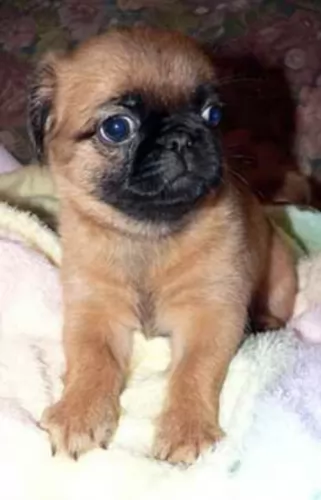 Like its two parental breeds, the Brug is a smaller sized dog – both parents are lab dogs and so is the Brug. Because they are hybrids, Brugs can be very different in appearance but most seem to have large eyes, squishy faces, black masks, fluffy hair, long black whiskers, short fluffy hair, flat ears and a fluffy tail. They could be in any of a number of colors including fawn, black, cream or apricot.
Like its two parental breeds, the Brug is a smaller sized dog – both parents are lab dogs and so is the Brug. Because they are hybrids, Brugs can be very different in appearance but most seem to have large eyes, squishy faces, black masks, fluffy hair, long black whiskers, short fluffy hair, flat ears and a fluffy tail. They could be in any of a number of colors including fawn, black, cream or apricot.
 As mentioned previously the Chorkie is a mix between the Yorkshire Terrier (Yorkie) and the Chihuahua. They Tend to look more like the terrier than the Chi with a small head carried high on a well-proportioned body, with the long silky hair of the Yorkie. Their head carried the shape of the Chihuahua. Like the Chihuahua, they have mostly pointed ears although some Chorkies have droopy ears. The Chorkie coat is silky, long, and can be in a variety of colors. The ears are either fringed like the Yorkie or smooth like the Chihuahua.
As mentioned previously the Chorkie is a mix between the Yorkshire Terrier (Yorkie) and the Chihuahua. They Tend to look more like the terrier than the Chi with a small head carried high on a well-proportioned body, with the long silky hair of the Yorkie. Their head carried the shape of the Chihuahua. Like the Chihuahua, they have mostly pointed ears although some Chorkies have droopy ears. The Chorkie coat is silky, long, and can be in a variety of colors. The ears are either fringed like the Yorkie or smooth like the Chihuahua.
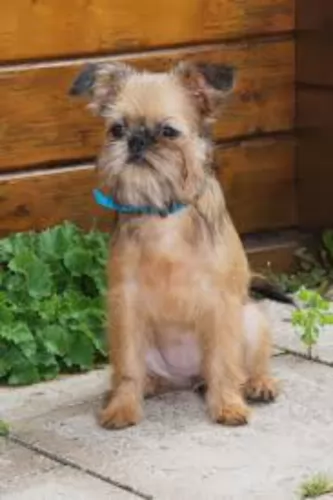 This hybrid is a loyal little dog. They are an affectionate lap dog that wants to be with his humans all the time. They have a very pleasant disposition and do well with children and other dogs. They might be shy to begin with but will warm up to affection. However, they are willful and self-important at times. This is tempered by their great sense of humor and empathy to its peoples’ moods. Left alone too long, they will tend to bark excessively.
This hybrid is a loyal little dog. They are an affectionate lap dog that wants to be with his humans all the time. They have a very pleasant disposition and do well with children and other dogs. They might be shy to begin with but will warm up to affection. However, they are willful and self-important at times. This is tempered by their great sense of humor and empathy to its peoples’ moods. Left alone too long, they will tend to bark excessively.
 Remember that the Chorkie is a cross breed and not a purebred. Its temperament is that of a mixed breed dog which is usually laid back and mellow. The Chorkie might bark a lot as both the Yorkshire and the Chihuahua are known to bark. It can carry the traits of either or both of its parents.
Remember that the Chorkie is a cross breed and not a purebred. Its temperament is that of a mixed breed dog which is usually laid back and mellow. The Chorkie might bark a lot as both the Yorkshire and the Chihuahua are known to bark. It can carry the traits of either or both of its parents.
The Chorkie is a great lap dog though he can be stubborn and wear their owner out with all their energy. They are playful and willful and need strong leadership despite their small size. They will bark at anything they find to be suspicious. Despite their size they are highly intelligent and very loyal, affectionate dogs. They love their people and will not like it if you leave them alone very often. They are quite brave to the point of being reckless and can be aggressive toward dogs a lot bigger than they are. Due to their courage and their barking they are great family dogs.
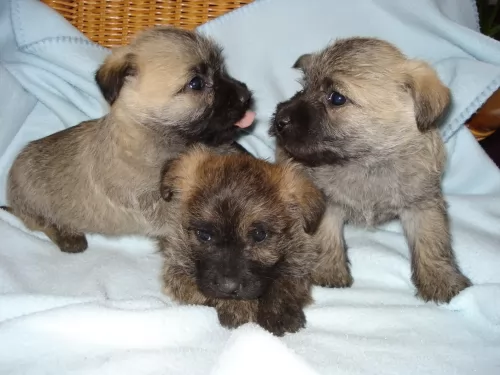 Usually the hybrid dog can have better health than either of the parents. This is true with the Brug as well, but there are also some issues they may inherit from the parents or face simply because of their size and complexion. These include:
Usually the hybrid dog can have better health than either of the parents. This is true with the Brug as well, but there are also some issues they may inherit from the parents or face simply because of their size and complexion. These include:
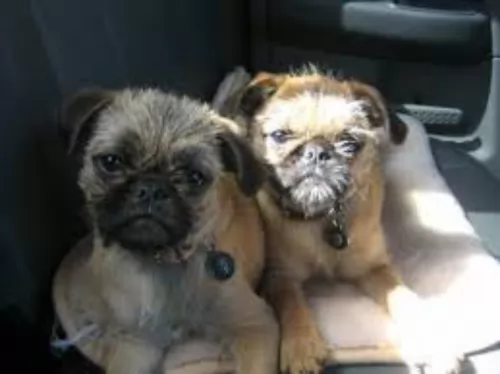 Don’t let this dog get overweight. Feed a high quality dry food intended for small or toy dogs. One fourth to one half of a cup per day in two separate meals is what is recommended.
Don’t let this dog get overweight. Feed a high quality dry food intended for small or toy dogs. One fourth to one half of a cup per day in two separate meals is what is recommended.
Patella Luxation or slipped knee caps – small dogs often have this issue. The patella is the knee cap and layman often called it a slipped knee cap, but it is also called slipped stifles. The femur, the tibia and the patella do not line up and this causes an abnormal gait or even lameness. Puppies are born with this, but it does not exhibit symptoms until years later. Arthritis is the most common result. Occasionally surgery is required.
Eye Issues – Cherry eye, a genetic disease, as well as irritation from air borne particles, allergies or scratches.
Skin Allergies – They can have skin allergies so watch for excessive licking or scratching.
Breathing Issues – Asthma and respiratory issues are common among small dogs with these types of faces.
Like their 2 breed parents, the Brug is a small but energetic hybrid. They need to play and run on a daily basis. Leash walks are good, but they need a yard or dog park as well. They are athletic little dogs and are good at tracking, obedience and agility. You cannot force them to do an activity but if its fun they will jump right in.
 These small dogs have a lot of energy and need to eat a food that is high in quality calories. No empty calories for these guys. Feed them at least twice a day and no more than a fourth of a cup of dry food for the entire day. They can become overweight easily so do not overfeed.
These small dogs have a lot of energy and need to eat a food that is high in quality calories. No empty calories for these guys. Feed them at least twice a day and no more than a fourth of a cup of dry food for the entire day. They can become overweight easily so do not overfeed.
Additional health issues might include knee cap dislocation leading to arthritis or lameness and a tendency to develop low blood sugar.
Again, these are high energy little dogs. They need to be exercised or at least have brisk play inside the house. They excel at competitive games such as barn hunt, agility and obedience.